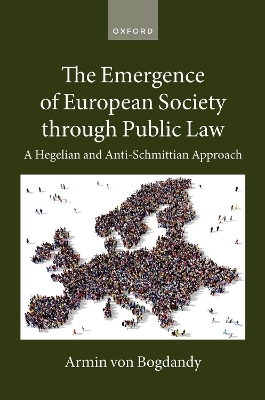
The Emergence of European Society through Public Law
A Hegelian and Anti-Schmittian Approach
Seiten
2024
Oxford University Press (Verlag)
978-0-19-890934-7 (ISBN)
Oxford University Press (Verlag)
978-0-19-890934-7 (ISBN)
Many Europeans struggle to understand where EU-centred Europeanization has led them. By reconstructing European public law in light of Article 2 of the Treaty on European Union (TEU), The Emergence of European Society Through Public Law offers a new narrative of European legal integration.
Many Europeans struggle to understand where EU-centred Europeanization has led them. The standard response - that their situation is sui generis, one of a kind - no longer holds. Brexit, conflicts over European financial transfers, immigration, or dubious judicial reforms in some Member States demand a more substantial answer.
Against that background, The Emergence of European Society Through Public Law: A Hegelian and Anti-Schmittian Approach frames European integration by reconstructing European public law in light of Article 2 of the Treaty on European Union (TEU). According to Article 2, all Europeans today are part of one society. European integration may not have produced a European federal state, but it has helped create a European society. This society is intimately interwoven with European public law, as the Treaty characterizes it with 12 constitutional principles. The book interprets this statement as the manifesto, identity, and constitutional core of a democratic society. Thus, Europeans should understand that European integration has ushered in a European democratic society.
Comprehensive and engaging, The Emergence of European Society Through Public Law examines the great debates of European public law and presents them in a new and forward-looking reconstruction. This new narrative of European legal integration will appeal to academics and students of EU law, constitutional and comparative law, sociology, political science, and legal history.
The Emergence of European Society Through Public Law is an open access title available under the terms of a CC BY-NC-ND 4.0 International licence. It is free to download from OUP and selected open access locations.
Many Europeans struggle to understand where EU-centred Europeanization has led them. The standard response - that their situation is sui generis, one of a kind - no longer holds. Brexit, conflicts over European financial transfers, immigration, or dubious judicial reforms in some Member States demand a more substantial answer.
Against that background, The Emergence of European Society Through Public Law: A Hegelian and Anti-Schmittian Approach frames European integration by reconstructing European public law in light of Article 2 of the Treaty on European Union (TEU). According to Article 2, all Europeans today are part of one society. European integration may not have produced a European federal state, but it has helped create a European society. This society is intimately interwoven with European public law, as the Treaty characterizes it with 12 constitutional principles. The book interprets this statement as the manifesto, identity, and constitutional core of a democratic society. Thus, Europeans should understand that European integration has ushered in a European democratic society.
Comprehensive and engaging, The Emergence of European Society Through Public Law examines the great debates of European public law and presents them in a new and forward-looking reconstruction. This new narrative of European legal integration will appeal to academics and students of EU law, constitutional and comparative law, sociology, political science, and legal history.
The Emergence of European Society Through Public Law is an open access title available under the terms of a CC BY-NC-ND 4.0 International licence. It is free to download from OUP and selected open access locations.
Armin von Bogdandy graduated in law and in philosophy. He has been President of the OECD Nuclear Energy Tribunal, a member of the German Science Council and the Scientific Committee of the EU Fundamental Rights Agency. He held visiting positions at the NYU School of Law, the EUI, and the Universidad Nacional Autonóma de México, among others. He is the recipient of the Leibniz Prize, the prize for outstanding scientific achievements by the Berlin-Brandenburg Academy of Sciences, the Premio Fix Zamudio, the Gavel of the Inter-American Court of Human Rights as well as several degrees Honoris Causa.
1: Outline
2: Concepts
3: Principles
4: Courts
5: Scholarship
6: This Book's Quintessence with Marius Iva%skevi%cius
| Erscheinungsdatum | 23.03.2024 |
|---|---|
| Reihe/Serie | Collected Courses of the Academy of European Law |
| Verlagsort | Oxford |
| Sprache | englisch |
| Maße | 163 x 240 mm |
| Gewicht | 658 g |
| Themenwelt | Recht / Steuern ► Allgemeines / Lexika |
| Recht / Steuern ► EU / Internationales Recht | |
| Recht / Steuern ► Öffentliches Recht | |
| ISBN-10 | 0-19-890934-9 / 0198909349 |
| ISBN-13 | 978-0-19-890934-7 / 9780198909347 |
| Zustand | Neuware |
| Informationen gemäß Produktsicherheitsverordnung (GPSR) | |
| Haben Sie eine Frage zum Produkt? |
Mehr entdecken
aus dem Bereich
aus dem Bereich
Sammlung des Zivil-, Straf- und Verfahrensrechts, Rechtsstand: 14. …
Buch | Hardcover (2024)
C.H.Beck (Verlag)
49,00 €
Klausuren, Hausarbeiten, Seminare, Bachelor- und Masterarbeiten
Buch | Softcover (2021)
C.H.Beck (Verlag)
12,90 €


